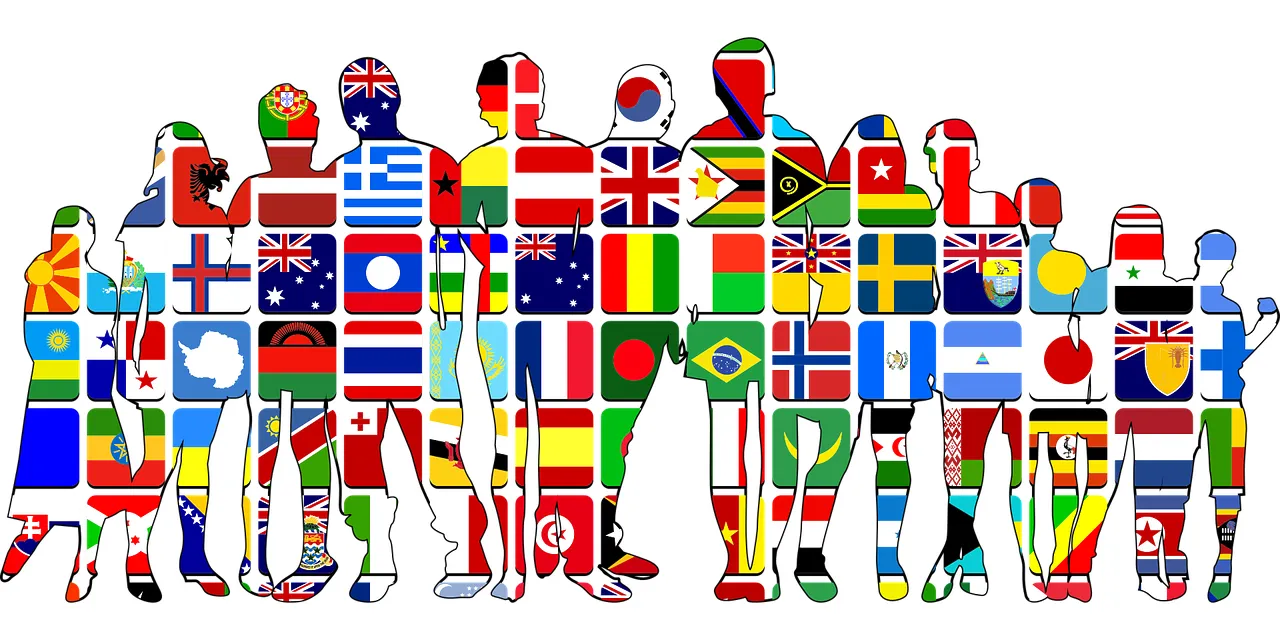There are currently 195 countries and over 6.000 existing languages. 90% of these languages are spoken by less than 100.000 people, and approximately only 150 to 200 languages are spoken by more than a million people.
Most spoken languages become increasingly popular while least spoken languages tend to become extinct. This raises the question: Will everyone be speaking the same language someday. In this article, we try to answer this question.

Which will be the chosen language for global communication?
Imagine a world where everyone speaks the same language. Sounds convenient, right? With globalization on the rise, more people are connecting and feeling the need to learn a new language to communicate. English seems to be leading the pack. From countries in Europe to places like Thailand and China, schools are making English a top priority.
English is seen as the main business language for internal relationship language and travel language, but it is not the most spoken first language worldwide. Chinese Mandarin, followed by Spanish, dominate the native language scene.
However, English language has way more non-native speakers. Combined with the number of native speakers, it outnumbers the use of Chinese Mandarin, and solely the number of second language English speakers exceeds the total number of Spanish speakers.
This is the ranking of the top most spoken native languages in the world.
With the increasing amount of people learning English as a second language, English will likely be the elected language for global communication, if there is a language everyone will be speaking one day. But will this happen someday? That is still the question.
Will everyone communicate in the same language?
People are now more connected than ever, and people now see more than ever the need to learn a language to enable communication with others. Humans feel the desire to be connected and do not want to miss out on anything. Therefore, English is usually taught as a second language to children in schools in hundreds of countries worldwide. For European countries to countries like Thailand, Israel or Arabia learning English has now become more of a priority in education.
With this trend, you might think we’re heading towards a world where most conversations happen in English. But here’s the twist: not every country is on the English train. Some, like Brazil, Russia, and even vast China, have a tiny percentage of English speakers. In China’s case, it’s shockingly less than 1%.
So, what’s next? Will these countries ramp up their English education and enable global communication in one language? Well, let us be clear in this matter: Even if they do, it won’t be a quick shift. It’s likely the younger generation and professionals will lead the charge. But getting everyone on board? That has still a very long way.
Questioning the Hegemony of English in the World
As globalization continues its march, we’re seeing a rising trend: more and more people are able to communicate in a common language. It’s becoming increasingly plausible that, within the next century, most western nations might overcome linguistic barriers entirely. Yet, this English wave isn’t universal. In countries like Brazil, Russia, Chile, Argentina, The Gambia, Malawi, Colombia, Swaziland, Tanzania, Algeria, Uganda, and even vast China, less than 10% of the population speaks English. In China’s case, it’s a mere 1%.
The big question is whether these nations will prioritize English education to join the global trend. If they resist, the dream of a universally shared language might remain just that—a dream. But if they embrace it, the transition won’t be swift. Realistically, it would be the younger generation and professionals who’d lead the charge. While achieving global linguistic unity could be a centuries-long endeavor, it’s not entirely out of the realm of possibility.
Will every other language disappear if a global language is stablished?
As mentioned before, minor languages are spoken by a reducing number of people. Experts claim that approximately one language gets lost every two weeks, and it is expected that there will be only 200 languages left in 100 years.
Linguistic experts agree with each other concerning the future of languages. They do not expect the widely spoken languages remaining in the future to be distinct. According to them, languages are too closely tied to culture, family and personal identity to disappear. Besides, there is a difference between business and enjoyment when it comes to languages.
Furthermore, the creation of new languages is not likely to happen anymore. Back in the days where new languages were created, usually two or more existing languages were combined when different nations crossed each other and tried to communicate.
The story of the Tower of Babel
According to the Book of Genesis in the Judeo-Christian Bible, there was a time following the Great Flood when humanity spoke a single language and shared a common culture. As they migrated from the east, they settled in the land of Shinar, which is believed to be modern-day southern Mesopotamia.
United in purpose and speech, the people decided to build a city with a tower that reached the heavens, not only as a testament to their own achievements but also to prevent themselves from being scattered across the world.
However, their ambition did not sit well with God. To prevent them from becoming too powerful and unified in their defiance against divine will, God decided to intervene and confounded their speech. As they only spoke one language, they could no longer understand one another. This led to confusion and an inability to continue their collective project. As a result, the people were scattered across the face of the earth, giving rise to the diverse languages and cultures we see today.
The city was named Babel, which sounds like the Hebrew word for “confused,” and it became a symbol of human hubris and the divine intervention that checks it.
This narrative might merely be religious symbolism, but researchers have looked into the idea of early people speaking a single mother tongue. Although there is no proof, it has been noticed that some of the oldest languages (Greek, Latin, and Sanskrit) have many similarities. This implies that all current languages are descended from a single source.

Pros and cons to a Universal Global Language
The idea of a universal language, particularly English, has been a topic of discussion for years. While there are undeniable advantages to having a global lingua franca, but there are also some drawbacks to consider.
Benefits of a universal language
On the Internet, English is the most widely used language so we can extract some of the conclusions from the benefits we have communicating through the internet. Let’s take a look at these advantages:
- Enhanced Global Communication: Using a single global language streamlines communication between nations, fostering better understanding and reducing the chances of misunderstandings.
- Economic Interactions: A shared language can boost international trade, as countries can negotiate and collaborate more efficiently.
- Digital Dominance: English dominates the digital realm. As of 2010, there were over 536 million English-speaking internet users, and approximately 5.5 billion web pages are in English.
- Educational opportunities: Learning is enhanced and more educational opportunities arise as many of the resources currently available in other languages can be accessed by more people.
- Research and Science: Around 66% of the world’s scientists and researchers use English as a second language, making it the primary medium for scientific discourse. Additionally, 25% of the global population has at least a basic to intermediate grasp of English.
Disadvantages of a universal language
Experts claim that there will be approximately 200 languages remaining in 100 years. According to us as linguists, if the trend continues and we finally stablish a unique universal language, this will bring more drawbacks than benefits as many of the remaining languages may dissapear.
- Cultural Erosion: A single global language could lead to the gradual disappearance of regional languages and dialects. As these fade, the rich tapestry of cultures, traditions, and histories associated with them might also diminish.
- Economic and Job Disparities: While certain professions might benefit from a universal language, others could face challenges. For instance, translators, regional content creators, and local language teachers might find their roles becoming obsolete. Additionally, non-native speakers might face barriers in professions where language nuances and mastery are crucial.
- Homogenization of Thought: Language shapes thought, and different languages offer unique perspectives and ways of processing information. A single language might limit diverse ways of thinking and problem-solving, potentially stifling innovation and creativity.
Fortunately for us, although English is making strides as a global language, it is a bit early to say it will be the world’s go-to language. For now, our diverse linguistic landscape isn’t going anywhere, and that adds its own flavor to global conversations.


